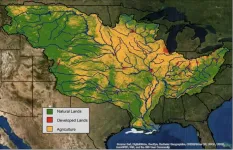AGU Annual Meeting
9 – 13 December 2024
Walter E. Washington Convention Center
801 Allen Y. Lew Place NW
Washington, D.C. 20001
8 December 2024
Press Release 24-40
EMBARGOED until Tuesday, 10 December at 8:00 am EST
Researcher contact:
Julia Gohlke, Virginia Polytechnic Institute and State University, jgohlke@vt.edu (UTC-5 hours)
AGU press contact:
Rebecca Dzombak, news@agu.org (UTC-5 hours)
WASHINGTON — Floods can shape someone’s health before they’re even born, according to new research. The findings will be presented on Tuesday, 10 December at AGU’s 2024 Annual Meeting in Washington, D.C., where more than 28,000 scientists will gather to discuss the latest Earth and space science research.
A new analysis of more than 3,000 studies from around the world reveals that globally, flooding increases preterm births by about 3%. Children who were in utero during a flood event are also more likely to have a low birth weight. Both these outcomes are risk factors for developing chronic health conditions such as asthma and diabetes later in life.
The study did not pinpoint the physical mechanisms by which floods might cause preterm births or low birth weights, but research into other disasters suggests stress, disruption and delayed access to health care are likely factors.
This analysis shows that flooding “has lifelong impacts,” said Julia Gohlke, an environmental health scientist at Virginia Tech who led the research. As climate change is already increasing flooding, this research will help give “a better estimate of what’s at stake.”
Higher waters, lower birth weights
Floods can impact human health directly, such as by causing injury or death, or spreading diseases. They can also have less direct impact, including prolonged stress and loss of income. But researchers are still working to understand the full suite of negative impacts on human health. Some studies have suggested that flooding can lead to worse outcomes for pregnant people and their babies, but results have been inconsistent.
To get a clearer idea of the impact of flooding on pregnancy, Gohlke and her colleagues analyzed findings from 3,177 studies that collected data on pregnancy length and birth weight and flooding from the 1800s to present. Data varied widely between floods and regions: While some researchers found no impact from flooding on pregnancy, others found compelling evidence that flooding increased the risk for complications during pregnancy and birth. For example, one 2008 study looking at pre-term birth following Hurricane Katerina concluded that a flood had caused around a 230% increase in pre-term births.
Altogether, the researchers found that any given flood increases the pre-term birth rate by around 3%, compared to an unflooded region. Around 7% more children who were in utero during a flood event were born with a low birth weight.
Stress can last a lifetime
Flooding might induce early labor and low birth weight for several reasons, Gohlke said. Stress can induce early labor. For instance, heat waves are linked to more pre-term births, possibly due to dehydration. Something similar might happen during flood events if water supplies are compromised or people must travel long distances on foot to get away from dangerous areas, as people had to in North Carolina due to Hurricane Helene this September.
Early births might also increase during floods because people are unable to get to healthcare in time to avoid going into labor. Pre-term birth can be halted if someone has access to healthcare services, but flooded or damaged roads might prevent them from getting there in time.
Low birth weights are often associated with pre-term births, but that’s not always the case, Gohlke said. People who eat less during pregnancy give birth to babies with lower birth weights, even if they go into labor on schedule. Because flooding can imperil people’s access to food, either by destroying crops or blocking access to food supplies, people who are pregnant during flooding might be more likely to give birth to smaller babies.
Pre-term birth and low birth weights don’t guarantee that a baby will develop neurological issues, obesity or diabetes later in life. But they do increase the risk. With that in mind, emergency services should aim to evacuate pregnant people before flooding events, Gohlke said. And as for pregnant people living in flood-prone areas, “it’s important that you have access to get somewhere for help,” even if your house doesn’t flood, she said.
#
Presentation information
Pregnancy Complications and Adverse Birth Outcomes During and Following Flood Events
Tuesday, 10 December 2024, 16:30 - 16:38 ET
University of DC & Catholic (Marriott Marquis)
We ask that stories about this research not publish before 8:00 a.m. EST on the date of the presentation.
#
AGU’s Annual Meeting (#AGU24) will bring more than 28,000 Earth and space scientists to the Walter E. Washington Convention Center in Washington, D.C. from 9-13 December. Members of the press and public information officers can request complimentary press registration for the meeting now through the end of the conference. Learn more about the press AGU24 experience in our online Press Center.
AGU (www.agu.org) is a global community supporting more than half a million advocates and professionals in Earth and space sciences. Through broad and inclusive partnerships, AGU aims to advance discovery and solution science that accelerate knowledge and create solutions that are ethical, unbiased and respectful of communities and their values. Our programs include serving as a scholarly publisher, convening virtual and in-person events and providing career support. We live our values in everything we do, such as our net zero energy renovated building in Washington, D.C. and our Ethics and Equity Center, which fosters a diverse and inclusive geoscience community to ensure responsible conduct.
END







